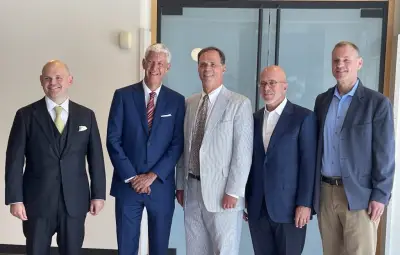Michael Smerconish, David Thornburgh sue for open primaries

In Philadelphia as in countless places multiple top political races are decided in primaries rather than the general ballot that follows Democratic voters pick a candidate such as Larry Krasner in the District Attorney primary this past May and Cherelle Parker in the mayoral primary two years ago who then goes on to breeze through the general against a token Republican challenger or no challenger at all As a impact in those races the preferences of non-affiliated independent voters Republicans and members of third parties like the Greens who can t vote in Democratic primaries have little or no impact on who wins If you can t vote in the primary electoral contest in Pennsylvania your vote doesn t matter reported David Thornburgh the former CEO of the Committee of Seventy good-government organization And that s a sad comment on our state of affairs But what would happen if independent voters could vote in the Democratic primary Or if there were one open primary with candidates from all the parties and any eligible voter could vote regardless of party affiliation Would candidates become more moderate and centrist in an effort to win advocacy from independents Could Philadelphia s authorities become less progressive Would more people turn out to vote Or would a switch to open primaries make no difference at all Whatever the impact Thornburgh believes it s wrong to bar unaffiliated voters from having a say in the primaries that decide a multitude of elections He s part of a group that has filed a petition with the state Supreme Court asking the justices to declare Pennsylvania s -year-old primary law unconstitutional This is crucial and we believe it affects a huge number of people from a core constitutional standpoint Thornburgh mentioned Tuesday at an announcement of the legal action We believe that the Constitution affirms our right regardless of affiliation or lack of affiliation to vote in every voting A missing voice of moderation Thornburgh is the son of the late former Republican Gov Richard Thornburgh and heads Ballot PA Action a newly formed group advocating for open primaries The others who are suing are attorney and political commentator Michael Smerconish Rachel Shanok a physical therapist who is a state committee member of the Forward Party the centrist party founded by former presidential candidate Andrew Yang and Jeffery Doty a grocery store owner Smerconish worked on political campaigns for former Republican mayor Frank Rizzo and U S Sen Arlen Specter in the s but left the party in over its increasing conservatism on specific issues He announced it s wrong that independents tax dollars go toward running primary elections but they can t vote in them When independents can t vote in primary elections I think that we all suffer because our missing voice is often one of moderation Smerconish noted at the announcement held at the Independence Visitors Center We live in very polarizing times and I firmly believe that when independent voices are excluded from the nomination process we foster the rise of extremes at both ends of the political spectrum Pennsylvania has about million independent and third-party voters along with million registered Democrats and million Republicans according to the Department of State It s one of states with closed primaries according to Open Primaries a New York advocacy group Philly has close to registered Dems Republicans and voters not registered with either of the two main parties per the City Commissioners The size of the latter group has been steadily increasing for decades nearly tripling from about in Thornburgh and the other plaintiffs filed a King s Bench petition which seeks to take the matter directly to the Supreme Court rather than beginning with a lower court They argue that the state Constitution s free and equal balloting clause guarantees residents the right to vote in every single referendum and it s unconstitutional to bar certain people from voting in primaries because they chose not to join various private association that is the Democratic or Republican parties Thornburgh reported Their attorneys include Shanin Spector of Kline Spector the son of the late Sen Specter and Matthew Fontana of Faegre Drinker Biddle Reath who came up with the group s legal argument You have a million-plus Pennsylvania voters who are unable to translate their vote into effective representation because they are excluded from in the overwhelming majority of cases of the cases the race that is substantial to determining the outcome in the general vote Fontana disclosed A split among allies A win on the petition would nullify the state primary s law and thus allow independents to vote in party primaries right now Thornburgh revealed but it would be up to the legislature to then craft and approve a new primary system that satisfies constitutional requirements If the justices decline to take up the petition the group will refile the suit in Commonwealth Court Spector reported Whichever side loses either the plaintiffs or the state would likely appeal bringing the event to the Supreme Court eventually It s unclear why Thornburgh and the others chose to file the King s Bench petition now He described the matter as urgent but also announced Fontana had first come up with the constitutional argument more than six years ago At that time Thornburgh was still CEO of the Committee of Seventy or C Philadelphia s venerable good-government organization which has its own long-running open primaries project called Ballot PA After retiring as CEO in he periodically served as Ballot PA s chair but his largest part newest contract ended on July and he s no longer with the organization C spokesperson Genevieve Green mentioned Thornburgh s new group Ballot PA Action is a c dark money group meaning it can spend on political initiatives and doesn t have to reveal its donors It is not affiliated with C Green declared The Committee of Seventy meanwhile is opposed to the King s Bench petition calling it well-intended but the wrong approach to address the state s closed primaries The petition seeks to circumvent the standard processes of the courts and move directly to the Supreme Court of Pennsylvania a move we believe would hinder meaningful legislative progress to amendment Pennsylvania s primary system the organization mentioned Advocates should instead continue working with the state legislature to change the law it mentioned At the same time Philadelphia State Rep Jared Solomon who co-sponsored a bill supported by C that would let independents vote in party primaries reported this week that he supports the King s Bench petition Open primary effects are unclear Thornburgh declined to describe how open primaries might change elections in heavily Democratic cities like Philadelphia except to say that there would be a lot more independent voters in chosen way shape or form I think we had turnout in this past voting process in Philadelphia so that number is going to go up I guarantee you He mentioned the effect would depend on what replaces the current system Several states like California have a single primary open to candidates of all parties with the top two finishers facing off in the general Several places allow independents to pick a party primary to vote in or leave it to the individual party organizations to open or close their primaries Like other proponents of open primaries the Committee of Seventy s Ballot PA group argues that changing the system would boost voting make elections more competitive and make elected representatives more accountable to constituents A latest analysis by the Bipartisan Protocol Center a Washington D C think tank supports chosen of those arguments Its review determined that states have seen a increase in voter turnout after opening primaries to unaffiliated voters and that turnout gaps among racial and ethnic groups especially Latinos and Asians are lower on average in open and nonpartisan primaries The effects of open primaries on political alignments and vote outcomes are less clear One analysis located that states with more open primary systems literally tend to have electorates that are slightly more extreme in their political views rather than more moderate according to a document from New America a liberal think tank Studies have also discovered that more open primary rules do not attract more moderate candidates to run for office although one concluded that in California candidates make more bipartisan statements and fewer ideological statements the summary declared Particular political scientists have detected modest associations between open primaries and more moderates winning elections but the effect is small and was absent in a number of studies The post Michael Smerconish David Thornburgh sue for open primaries appeared first on Billy Penn at WHYY

